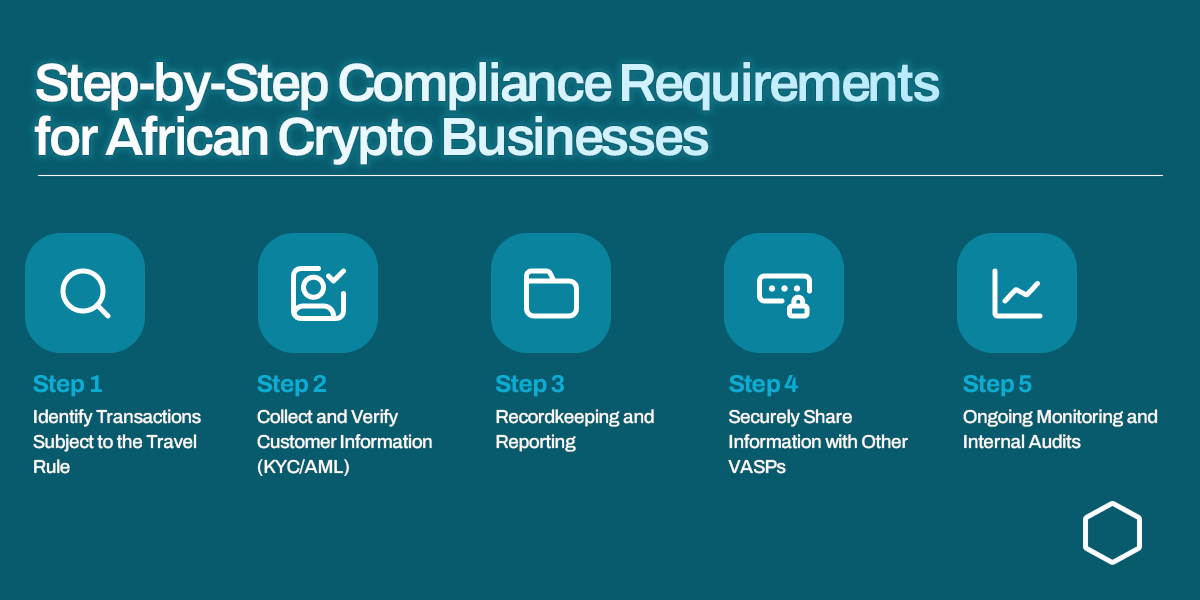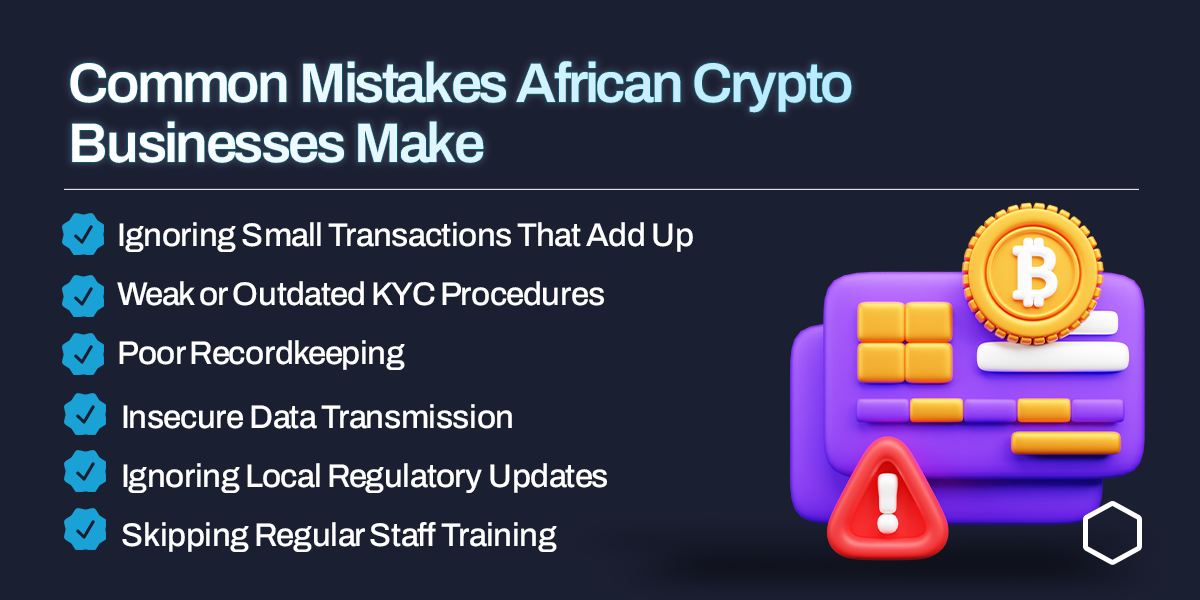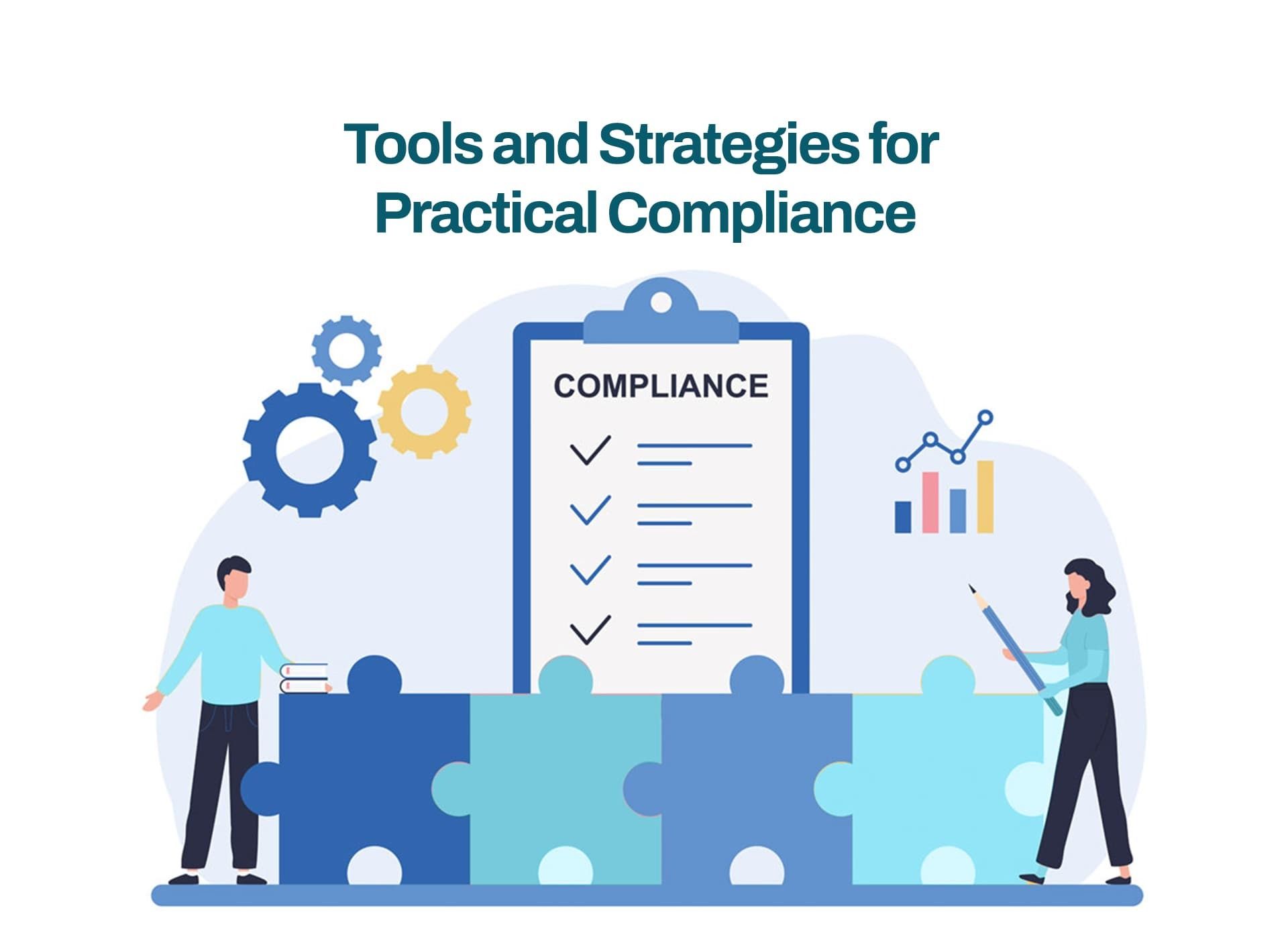Table of Contents
- What is the FATF Travel Rule?
- Step-by-Step Compliance Requirements for African Crypto Businesses
- Common Mistakes African Crypto Businesses Make
- Tools and Best Practices for Compliance
- To Recap
- FAQs
What Is the FATF Travel Rule?
The Financial Action Task Force (FATF) Travel Rule is a global anti-money laundering (AML) standard designed to make cryptocurrency transactions more transparent and harder to exploit for crimes such as money laundering, terrorism financing, and fraud.
You can think of it as a “know-your-customer (KYC) requirement for transfers between crypto businesses.”
The Origin of the Rule:
- The FATF is an international organisation that sets standards for fighting financial crimes.
- In 2019, FATF updated its Recommendation 16, originally meant for traditional banks, to include Virtual Asset Service Providers (VASPs) such as crypto exchanges, wallet providers, and peer-to-peer (P2P) platforms.
- The goal of this is to ensure crypto transactions follow similar rules as wire transfers in the banking system.
Core Requirement:
The Travel Rule requires VASPs to collect, verify, and share key customer details whenever a crypto transfer equals or exceeds about USD/EUR 1,000 (or the local currency equivalent, such as around ₦1.6 million in Nigeria or ZAR 25,000 in South Africa).
These details must “travel” with the transaction, hence the name “Travel Rule.”
Who Must Comply:
The Travel Rule applies to all Virtual Asset Service Providers (VASPs), including:
- Centralised crypto exchanges
- Wallet providers (custodial and certain non-custodial services)
- P2P crypto trading platforms
- Any business facilitating crypto transfers above the set threshold
If you operate a crypto exchange or fintech platform in Africa, whether in Nigeria, Kenya, South Africa, or elsewhere, you’re expected to comply once your jurisdiction adopts FATF’s standards (many already have or are in the process).
Why It Matters for African Crypto Businesses
- Regulators Are Enforcing It: South Africa’s Financial Intelligence Centre and Nigeria’s SEC have signaled that FATF recommendations guide their crypto regulations.
- Penalties Are Costly: Failure to comply can lead to heavy fines, suspension of licenses, or complete shutdown of operations.
- Global Operations Depend on It: If your business wants to send or receive crypto from international exchanges, you must prove Travel Rule compliance or risk being blocked from global payment networks.
Step-by-Step Compliance Requirements for African Crypto Businesses
Step 1: Identify Transactions Subject to the Travel Rule
Not every crypto transaction needs Travel Rule reporting. The rule generally applies when:
- The transaction amount is USD/EUR 1,000 or more (or the local equivalent).
- The transaction is between two Virtual Asset Service Providers (VASPs), such as crypto exchanges or custodial wallets.
Actions to take:
- Configure your platform to flag all transfers that meet or exceed the threshold.
- Set alerts for multiple small transfers from the same customer that might be an attempt to avoid the threshold (known as structuring).
- Update this threshold if your local regulator sets a different limit.
Step 2: Collect and Verify Customer Information (KYC/AML)
For any flagged transaction, you must collect and verify the sender’s and receiver’s details before the transfer is approved.
Information to collect and confirm:
Actions to take:
- Use KYC verification tools (such as ID document checks, selfie verification, and address confirmation).
- Build automated checks to reject or hold transactions when required details are missing.
- Store this information securely, in line with your country’s data protection rules.
Tip: Obiex offers automated KYC and secure user verification features, which can reduce manual work and errors.
Step 3: Recordkeeping and Reporting
Regulators require crypto businesses to store records of all qualifying transactions and the related customer data. Most African regulators (e.g., Nigeria’s SEC, South Africa’s FIC) follow a five-year minimum record retention period.
Actions to take:
- Keep digital records of all Travel Rule transactions, including the collected data, transaction IDs, and timestamps.
- Ensure your system can generate audit-ready reports quickly when requested by authorities.
- Schedule regular internal checks to confirm that records remain complete and accurate.
Step 4: Securely Share Information with Other VASPs
When a customer sends crypto to another exchange or wallet provider, you must send the collected data to the receiving VASP at the same time as the transaction.
Actions to take:
- Use a secure data transfer protocol (such as end-to-end encrypted APIs) to protect sensitive personal data.
- Agree on a standard data format with your partner VASPs so that information is readable and verifiable on both sides.
- Document every information-sharing action for audit trails.
Step 5: Ongoing Monitoring and Internal Audits
Compliance does not stop once a transaction is complete. You must continuously watch for suspicious patterns and maintain internal controls.
Actions to take:
- Set up risk-based monitoring systems to spot unusual activity (e.g., sudden large transfers, high-risk jurisdictions).
- File Suspicious Transaction Reports (STRs) with your national regulator whenever you detect unusual or potentially illegal activity.
- Conduct regular staff training and at least one formal compliance audit every year.

Quick Checklist for Teams
Common Mistakes African Crypto Businesses Make
1. Ignoring Small Transactions That Add Up:
Many businesses focus only on single transfers over the USD/EUR 1,000 threshold and overlook repeated smaller transfers.
Why It’s Risky: Customers who want to hide their activity may split a large amount into many small transactions (known as structuring or smurfing). Regulators view this as deliberate evasion.
How to Fix It:
- Set up automated systems to flag multiple small transfers from the same user within a short time.
- Treat the combined value as one transaction for Travel Rule purposes.
2. Weak or Outdated KYC Procedures:
Some platforms collect basic ID but skip deeper checks like address verification or live photo matching.
Why It’s Risky: Fake or stolen identities can pass simple checks, exposing your business to fraud and regulatory penalties.
How to Fix It:
- Use multi-step KYC tools (government ID + biometric selfie + address confirmation).
- Re-verify existing customers periodically, especially those with high trading volumes.
3. Poor Recordkeeping:
Failure to keep organised, complete records is one of the top reasons businesses fail audits.
Why It’s Risky: Regulators in countries like Nigeria and South Africa generally require five years of transaction records. Missing or incomplete files can lead to fines or license suspension.
How to Fix It:
- Store all Travel Rule–related data (customer details, transaction IDs, timestamps) in a secure, searchable database.
- Schedule monthly internal reviews to ensure records are complete and backed up.
4. Insecure Data Transmission:
Some businesses send customer details via unencrypted email or spreadsheets.
Why It’s Risky: Exposing personal data violates privacy laws and can cause breaches or reputational damage.
How to Fix It:
- Use end-to-end encryption and secure API connections to share data with other VASPs.
- Adopt a standardised format (such as the InterVASP messaging standard) so information is both secure and easy to read.
5. Ignoring Local Regulatory Updates:
African regulations evolve quickly. For example, Kenya and Nigeria have recently tightened crypto AML rules.
Why It’s Risky: FATF gives guidance, but each country can add extra requirements or set different thresholds.
How to Fix It:
- Assign a compliance officer to monitor local central bank and securities commission updates.
- Update your internal compliance policy immediately after any regulatory change.
6. Skipping Regular Staff Training:
Employees who don’t understand Travel Rule obligations may accidentally process non-compliant transactions.
Why It’s Risky: One staff error can expose the entire company to fines or license loss.
How to Fix It:
- Hold quarterly compliance training sessions.
- Provide simple checklists and flowcharts for frontline staff.

Tools and Best Practices for Compliance
1. Key Compliance Tools
These tools help you collect customer data, transmit it securely, and generate audit-ready reports with minimal manual effort.
2. Best Practices to Strengthen Compliance
a. Build a Risk-Based Monitoring Program:
- Why: Regulators expect crypto businesses to detect and report unusual activity beyond basic thresholds.
- How: Create a scoring system that flags high-risk transactions. E.g., sudden large trades, transfers to sanctioned countries, or repeated small deposits.
b. Maintain a Detailed Compliance Policy:
- Document every step: how you collect KYC data, how you transmit Travel Rule information, and how long you store it.
- Review and update the policy whenever FATF or local regulators (e.g., Nigeria’s SEC or South Africa’s FIC) release new guidance.
c. Encrypt and Secure All Data:
- Use end-to-end encryption for data in transit and at rest.
- Restrict access to sensitive files with strong user permissions and multi-factor authentication.
d. Train Staff Regularly:
- Provide quarterly training for onboarding teams, customer support, and technical staff.
- Share simple checklists and flowcharts so employees can quickly recognise Travel Rule requirements during daily operations.
e. Schedule Internal Audits
- Conduct compliance audits at least once a year to find gaps before regulators do.
- Test how quickly your team can produce requested records and demonstrate secure data sharing.
3. How Obiex Simplifies Compliance
African crypto businesses can save time and reduce errors by using Obiex’s built-in compliance features, including:
- Automated KYC/AML verification to confirm customer identities.
- Exportable transaction histories and account statements for easy reporting.
- Secure API integrations to share Travel Rule data with partner VASPs without exposing sensitive information.
These tools allow teams to stay focused on growth while meeting global and local regulations.
To Recap
Travel Rule compliance is non-negotiable. African crypto businesses must take immediate action to implement the necessary procedures and tools to meet FATF Travel Rule requirements.
By doing so, they can avoid penalties and contribute to a more secure and transparent crypto ecosystem.
Protect your business and stay compliant. Sign up on Obiex now.
FAQs
Q1. What is the FATF Travel Rule, and who must comply?
The FATF Travel Rule requires VASPs to collect and share specific customer information during certain crypto transactions. All VASPs handling transactions above the specified threshold must comply.
Q2. How can African crypto businesses collect required customer info?
Implement robust KYC procedures, including identity verification and address confirmation, to collect the necessary customer information.
Q3. What records must be kept for Travel Rule compliance?
Maintain records of all transactions subject to the Travel Rule, including customer information and transaction details, for a specified period, typically five years.
Q4. How do businesses securely share info with other VASPs?
Utilise secure data transmission protocols and standardized data formats to share customer information with other VASPs.
Q5. Can Obiex help African businesses stay Travel Rule compliant?
Yes, Obiex offers tools that assist businesses in meeting compliance requirements efficiently.
Q6. What are the penalties for non-compliance?
Penalties can include fines, suspension of operations, and reputational damage.
Q7. Are there any exemptions to the Travel Rule?
Exemptions vary by jurisdiction. It's essential to consult local regulations to determine any applicable exemptions.
Q8. How often should compliance procedures be reviewed?
Regular reviews, at least annually, are recommended to ensure ongoing adherence to regulations.
Q9. Is the Travel Rule applicable to all crypto transactions?
No, it applies only to transactions above the specified threshold.
Q10. Where can I find more information on FATF recommendations?
Visit the official FATF website at https://www.fatf-gafi.org/en/home.html.
Disclaimer: This article was written to provide guidance and understanding. It is not an exhaustive article and should not be taken as financial advice. Obiex will not be held liable for your investment decisions.



